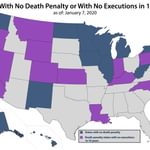
On January 7, 2020, Louisiana marked the passage of ten years since its last execution.
As a result of the milestone, two-thirds of U.S. states have now either abolished the death penalty or gone at least a decade without an execution. Twenty-one U.S. states have judicially or legislatively abolished capital punishment. With Louisiana joining their ranks, 12 of the 29 states that still authorize the death penalty (41.4%) have gone more than a decade without carrying out an execution. (Click here to enlarge map.)
Louisiana last carried out an execution on January 7, 2010, putting Gerald Bordelon to death by lethal injection. His execution was the 28th in Louisiana in the modern era of the death penalty. Prior to Bordelon’s, Louisiana had not executed anyone since 2002.
As the state approached the anniversary of Bordelon’s execution, advocates for the abolition of the death penalty planned a vigil outside the headquarters of Resurrection After Exoneration, a non-profit founded by death-row exoneree John Thompson. Citing high costs, wrongful convictions, and declining public support for capital punishment, Michael Cahoon of the Promise of Justice Initiative, called the 10-year execution hiatus “indicative that the system is broken beyond repair.” The Promise of Justice Initiative, which represents Louisiana death-row prisoners and advocates for death-penalty abolition, was one of the sponsors of the event.
According to State Public Defender James Dixon, the Louisiana Public Defender Board spent more than $100 million on defense costs for death-penalty cases between 2008 and 2019. The figure does not include other death-penalty costs, such as prosecution, incarceration, and court costs.
Louisiana has exonerated 11 people from death row, making it fourth in the U.S. for number of death-row exonerations. Three of those exonerations took place in the decade since the state last carried out an execution. Among Louisiana’s notable exonerations are John Thompson, who was exonerated in 2003 after an investigator discovered that prosecutors withheld evidence, and Glenn Ford, who, at the time of his 2015 exoneration, was the nation’s longest-serving death-row exoneree. Thompson’s case gained notoriety after a jury awarded him $14 million in a lawsuit against the office of the prosecutor whose misconduct had resulted in his wrongful conviction. The U.S. Supreme Court overturned the ruling, granting prosecutors conditional immunity from civil liability for misconduct. In dissent, Justices Ginsburg, Breyer, Sotomayor and Kagan argued that the evidence “established persistent, deliberately indifferent conduct for which the District Attorney’s Office bears responsibility.”
As in other states, the difficulty of obtaining lethal-injection drugs has also played a role in the decline in executions. However, the ten-year gap in executions is not the only indication that Louisiana’s death penalty is in decline. The state imposed 14 new death sentences in the decade of the 2010s, and only one in the past four years. The two death sentences imposed in the second half of the 2010s were 26 times fewer than the state imposed during Louisiana’s death-sentencing peak between 1995 – 1999. The state imposed 52 new death sentences during that period, for an average of 10.4 new death sentences per year.
In 2019, a bipartisan team of legislators proposed bills to abolish the death penalty. Bills passed committees in both the House and the Senate, but the Senate bill failed a floor vote and the House bill was withdrawn. The effort gained strong support from religious leaders in Louisiana.
Louisiana is one of a number of death-penalty states to be reaching no-execution milestones. In December, Indiana marked its tenth year without an execution. On June 18, 2020, Utah also will reach a decade without an execution.
Kaylee Poche, Activists to hold a vigil Jan. 7 marking a decade since Louisiana last executed a death row inmate, Gambit, December 26, 2019.
Innocence
Oct 15, 2024


